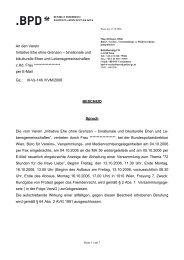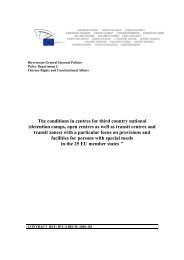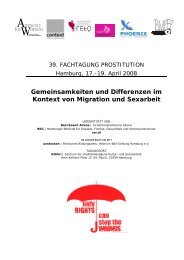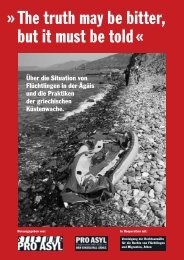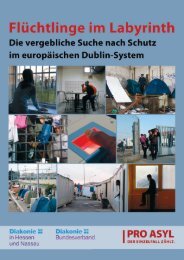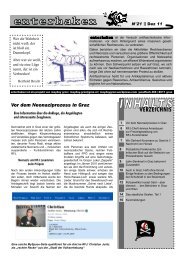Turin's CIE - International University College of Turin
Turin's CIE - International University College of Turin
Turin's CIE - International University College of Turin
You also want an ePaper? Increase the reach of your titles
YUMPU automatically turns print PDFs into web optimized ePapers that Google loves.
“6(1) In the determination <strong>of</strong> his civil rights and obligations or <strong>of</strong> any criminal charge<br />
against him, everyone is entitled to a fair and public hearing within a reasonable time by<br />
an independent and impartial tribunal established by law. Judgement shall be<br />
pronounced publicly by the press and public may be excluded from all or part <strong>of</strong> the trial<br />
in the interest <strong>of</strong> morals, public order or national security in a democratic society, where<br />
the interests <strong>of</strong> juveniles or the protection <strong>of</strong> the private life <strong>of</strong> the parties so require, or<br />
the extent strictly necessary in the opinion <strong>of</strong> the court in special circumstances where<br />
publicity would prejudice the interests <strong>of</strong> justice.”<br />
However, Article 6(1) ECHR does not apply to expulsion and extradition proceedings and there<br />
are only very limited circumstances when it can apply to immigration matters 101 . In fact, this<br />
distinction between rights protection in criminal matters and rights protection in civil or<br />
administrative matters exists both in the ECHR as well as in Italian domestic law and procedure.<br />
There is a big difference between the procedural guarantees and protections that are afforded<br />
to migrants in immigration matters when compared with those rights guaranteed to accused<br />
people in the criminal justice system. Yet, in both cases an individual risks losing their liberty.<br />
Article 13 <strong>of</strong> the ECHR states:<br />
“13 Everyone whose rights and freedoms as set forth in this Convention are violated<br />
shall have an effective remedy before a national authority […].”<br />
Article 13 ECHR exists in order to ensure that there are remedies in national legal orders to<br />
examine and enforce the other rights and freedoms that are protected in the ECHR. Italy is<br />
obliged to provide an effective method <strong>of</strong> examining whether or not a violation has occurred,<br />
regardless <strong>of</strong> whether a violation actually occurred. In order to comply with the right to an<br />
effective remedy, the Italian domestic legal regime must ensure the following 102 :<br />
a) The remedy needs to exist institutionally 103 ;<br />
b) The remedy must be adequate 104 ; and<br />
c) The remedy must be available to the individual.<br />
The third requirement that a remedy must be available to the individual is particularly relevant<br />
when considering the extent to which some detainees actually understand what <strong>CIE</strong> is and what<br />
their personal legal circumstances and options are. For example, Article 13 ECHR has been<br />
interpreted to mean that an asylum seeker must not only have access to an appeal procedure,<br />
but they should also be in a position to initiate such an appeal and that appeal should have a<br />
suspense effect 105 .<br />
101 See for example Maaouia v. France, 39652/98, Council <strong>of</strong> Europe: European Court <strong>of</strong> Human Rights, 22<br />
March 2000.<br />
102 See Hélène Lambert, The position <strong>of</strong> aliens in relation to the European Convention on Human Rights,<br />
Council <strong>of</strong> Europe Publishing (2006), 37-38.<br />
103 Silver and Others v. United Kingdom, 9310/81, Council <strong>of</strong> Europe: European Court <strong>of</strong> Human Rights, 6<br />
September 1987, para. 113; Leander v. Sweeden, 9248/81, Council <strong>of</strong> Europe: European Court <strong>of</strong> Human<br />
Rights, 26 March 1987, paras. 29-30; and Klass and Others v. the Federal Republic <strong>of</strong> Germany, (Series A, 28)<br />
2 EHRR 214, 6, Council <strong>of</strong> Europe: European Court <strong>of</strong> Human Rights, 6 September 1978, para. 67.<br />
104 See for example Chahal v. The United Kingdom, 70/1995/576/662, Council <strong>of</strong> Europe: European Court <strong>of</strong><br />
Human Rights, 15 November 1996.<br />
105 Lambert, The position <strong>of</strong> aliens in relation to the European Convention on Human Rights. See also,<br />
Committee <strong>of</strong> Ministers <strong>of</strong> the Council <strong>of</strong> Europe, Commission Report on Platform “Ärzte für das Leben” v.<br />
Austria, judgment <strong>of</strong> 21 June 1988; Recommendation No. R 98(13) <strong>of</strong> the Committee <strong>of</strong> Ministers <strong>of</strong> the<br />
Council <strong>of</strong> Europe, Explanatory Memorandum, para. 16.<br />
59 | P a g e




